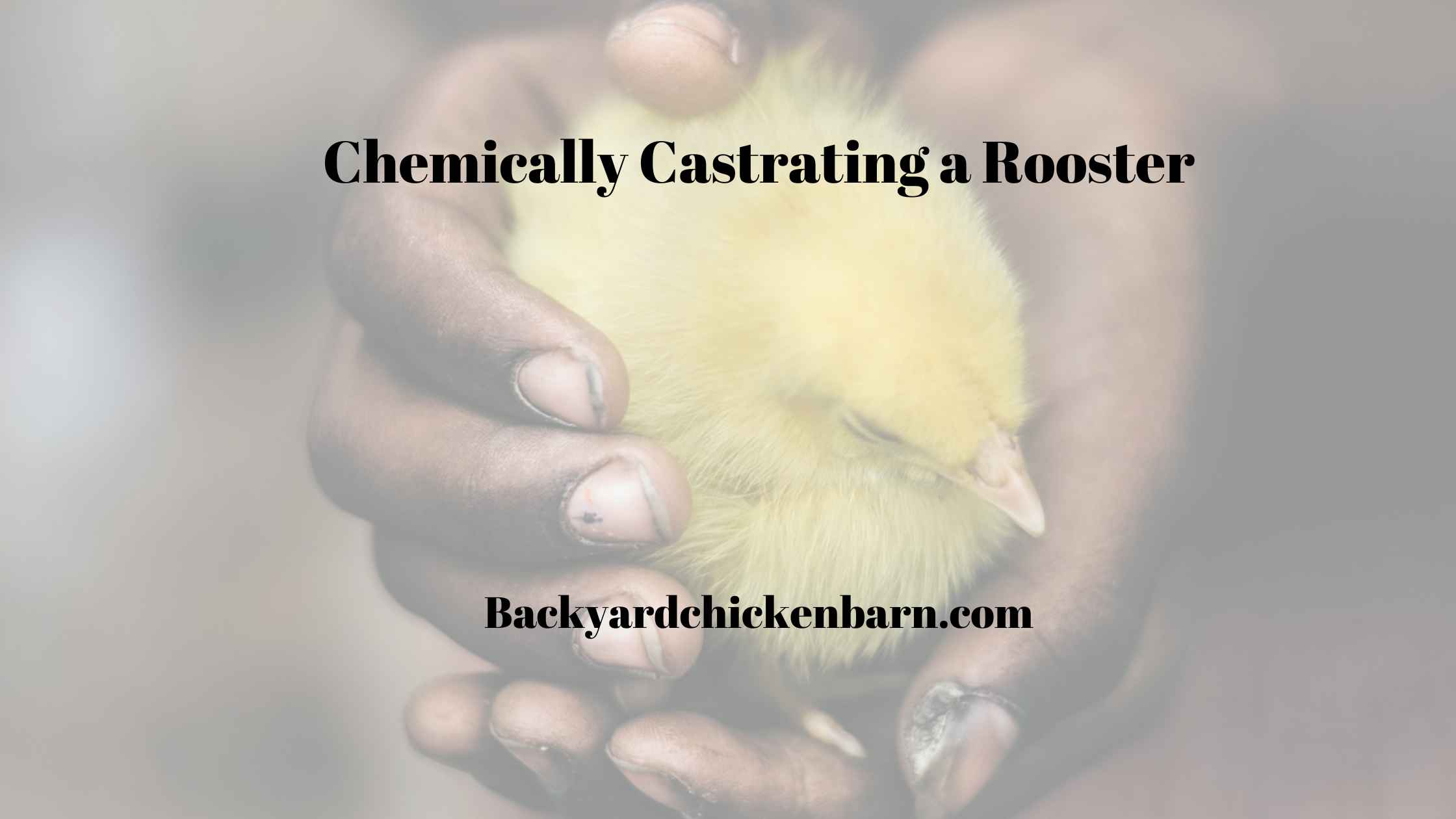Chemically Castrating a Rooster – What to Know
Chemical castration, also referred to as caponizing in poultry, is a method of rendering a rooster sterile by inhibiting his ability to produce or disseminate testosterone.
This process typically involves using chemicals or drugs rather than performing a surgical procedure.
Chemical castration can modify certain behaviors often associated with sexually mature roosters, such as aggression or crowing, and can also influence meat quality in broilers.
1. The Purpose of Chemical Castration
Chemical castration is often employed for several reasons:
- Behavior Modification: Reduces aggressive behavior, making the bird easier to manage.
- Noise Reduction: Can decrease or eliminate the crowing of roosters.
- Meat Quality: Chemically castrated roosters, or capons, tend to have more tender, flavorful, and juicy meat compared to regular roosters.
2. Methods of Chemical Castration
The most common method involves the use of drugs or hormones that suppress testosterone production.
The specific chemicals or drugs used can vary and the efficiency and ethical concerns about these chemicals should be understood fully before use.
3. Benefits
- Non-Surgical: Avoids the complications and risks associated with surgical castration.
- Reversible: Unlike surgical methods, chemical castration can be temporary, depending on the substance used.
4. Drawbacks
- Ethical Concerns: The use of chemicals can raise welfare concerns, both in terms of potential pain or distress and long-term health impacts.
- Effectiveness: It may not always be as effective as surgical methods, and results can vary.
- Residue Concerns: There might be concerns about drug residues in meat if the bird is meant for consumption.
5. Alternatives to Chemical Castration
- Surgical Caponizing: An older method where the rooster’s testes are removed surgically.
- Physical Methods: Devices like anti-crowing collars can help reduce the volume of a rooster’s crow without affecting its hormonal balance.
6. Points to Consider
- Legal Implications: Some regions may have restrictions or bans on certain methods of castration, including chemical methods.
- Health Monitoring: Regularly monitor the rooster for any adverse reactions or health complications.
- Consultation: Always consult with a veterinarian before attempting chemical castration to ensure the method is appropriate and safe for the specific bird.
Conclusion
Chemically castrating a rooster can be an effective method to manage unwanted behaviors or improve meat quality.
However, like all procedures, it’s essential to weigh the benefits against the potential drawbacks, consider the ethical implications, and ensure that the bird’s well-being is always a top priority.
ALSO SEE: Chicken Dislocated Hip

FAQs on Chemically Castrating a Rooster
- What is chemical castration for roosters?
- Chemical castration involves using chemicals or drugs to inhibit a rooster’s ability to produce or disseminate testosterone, thereby rendering him sterile.
- Why would one consider chemically castrating a rooster?
- To reduce aggressive behavior, decrease crowing, or improve meat quality.
- Is chemical castration permanent?
- It can be temporary or permanent, depending on the chemicals or drugs used.
- Are there ethical concerns regarding this process?
- Yes, some individuals raise concerns about potential pain, distress, and long-term health impacts on the bird.
- Is the meat of a chemically castrated rooster safe to eat?
- There can be concerns about drug residues in the meat. It’s essential to ensure the chemicals used are approved for this purpose and to observe any required withdrawal periods.
- How does chemical castration affect a rooster’s behavior?
- It can reduce aggressive behaviors and crowing.
- Is chemical castration painful for the rooster?
- The discomfort varies based on the chemicals used, but some methods can cause distress.
- How does chemical castration compare to surgical methods?
- Chemical methods are non-surgical and can be reversible, while surgical methods are more invasive and permanent.
- Are there legal restrictions on chemical castration?
- Some regions may have restrictions or bans on certain methods, including chemical castration.
- How soon after chemical castration will behavior changes be noticeable?
- This varies depending on the chemicals used, but changes can often be observed within a few days to weeks.
- Does chemical castration affect a rooster’s lifespan?
- There isn’t conclusive evidence, but any adverse effects from the chemicals can potentially impact lifespan.
- Can all roosters undergo chemical castration?
- It’s essential to consult a veterinarian, as some roosters might not be suitable candidates due to age, health, or other factors.
- Are there any potential side effects?
- Yes, potential side effects include allergic reactions, hormonal imbalances, or other health complications.
- Can chemical castration prevent a rooster from crowing?
- It can decrease or eliminate crowing in some roosters.
- What are the costs associated with chemical castration?
- Costs vary depending on the method, drugs used, and region.
- Is chemical castration common in the poultry industry?
- It’s less common than surgical methods but is used in specific contexts.
- How long does the process take?
- The administration can be quick, but the full effect might take days to weeks.
- Are there risks of overdose?
- Yes, it’s crucial to administer the correct dosage to avoid potential health risks.
- How often does the procedure need to be repeated?
- This depends on the chemicals used and the desired effect.
- Can I perform chemical castration at home?
- It’s strongly recommended to consult and possibly involve a veterinarian due to potential complications.
- Does chemical castration affect egg production in hens?
- Chemical castration targets roosters. However, any chemicals used around hens should be done with caution.
- Are there any natural alternatives to chemical castration?
- There aren’t natural methods that achieve the same results, but behavioral training and environmental changes can help manage some unwanted behaviors.
- Does a chemically castrated rooster look different?
- Over time, they may exhibit less of the typical male characteristics due to reduced testosterone.
- Is chemical castration the same as caponizing?
- Caponizing traditionally refers to surgically removing the rooster’s testes, but the term can also be used more broadly to describe any method that renders a rooster sterile.
- Are capons (castrated roosters) more valuable in the market?
- In some cultures, capon meat is considered a delicacy and can fetch higher prices.
- Do chemically castrated roosters need special care?
- They should be monitored for any adverse reactions or health complications post-procedure.
- Is there a risk of infection?
- Chemical castration reduces risks associated with surgical procedures, but there’s always a minimal risk when introducing substances into the body.
- Do chemically castrated roosters get along better with other birds?
- They tend to be less aggressive and may integrate better in mixed flocks.
- What is the main hormone targeted in chemical castration?
- Testosterone.
- Does chemical castration impact a rooster’s growth rate?
- Growth can be affected due to hormonal changes.
- Is chemical castration used in other animals?
- Yes, it’s also considered for certain pets and livestock to manage reproduction and behavior.
- Can a rooster’s fertility return after chemical castration?
- If a reversible method is used, fertility may return after some time.
- Does the procedure cause stress to the bird?
- Any procedure can cause some level of stress, but it varies based on the method and the individual bird.
- Are there studies on the long-term effects of chemical castration in roosters?
- Research is ongoing, and while some studies exist, more comprehensive research is needed.
- How do I know if the procedure was successful?
- Behavioral changes, reduced crowing, and lack of fertile eggs are indicators.
- Do veterinarians receive training in this procedure?
- Many vets specializing in poultry or avian care are trained in various castration methods.
- What are the welfare concerns associated with chemical castration?
- Concerns include potential pain, distress, long-term health impacts, and ethical considerations around altering an animal’s natural state.
- Can this procedure affect a rooster’s appetite?
- Hormonal changes might influence appetite, but individual responses can vary.
- Where can I get more information on this procedure?
- Veterinary clinics, poultry experts, and specialized literature are good resources.
- Is chemical castration a modern practice?
- The concept isn’t new, but modern drugs and methods have evolved over time.


